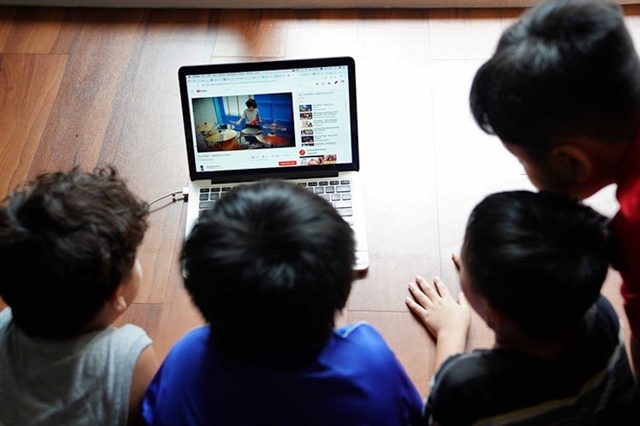 Opinion
Opinion

 |
| Four children watch YouTube videos on their parents' laptop. — Photo daidoanket.vn |
HÀ NỘI — Việt Nam is grappling with growing concerns over online risks faced by children as the country's internet usage, among the highest globally, continues to surge.
A World Vision Vietnam survey revealed that nine of ten children in Việt Nam use the internet daily, which can cause negative impacts ranging from online bullying to exposure to illegal activities.
Hiền, a parent in Hà Nội, finds it difficult to monitor her children's internet use from 5pm to 11pm, ostensibly for schoolwork.
"They use the excuse of doing homework assigned on the school's software to cling to their smartphones for hours a day," said Hiền, who runs an evening food stall with her husband, limiting their ability to supervise.
Thu, another parent in Hà Nội, gave her 14-year-old daughter a smartphone to use the internet for homework. However, her daughter also uses it for social media and online games.
"My husband and I work all day, while my daughter has school for half a day, so it's difficult to manage her internet use," Thu said.
These parental anxieties are common across Việt Nam.
Đinh Thị Như Hoa, Head of the Inspection Department at the Vietnam Cybersecurity Emergency Response Centre, emphasised the rising number of children using the internet and the potential for negative consequences without proper controls.
"Children may face cyberbullying and coercion into illegal activities. There is also the risk of personal information leaks," said Hoa.
The Ministry of Information and Communications (MIC) has issued a Code of Conduct for Child Protection in Cyberspace to establish behavioural standards and safeguard children in the digital environment.
The code sets guidelines for five key groups, including children, promoting a healthy online environment and enabling creative and constructive interaction.
Ngô Tuấn Anh, Chairman of the Vietnam Cyber Safety for Children Club, stated that the code complements existing legal frameworks, including the 2021-2025 programme for children's online safety.
He stressed the need for stronger regulations on internet services, platforms and content providers and emphasised parents' role in guiding, monitoring and teaching online safety skills.
James Kang, Senior Lecturer in Computer Science at RMIT University Vietnam, said that with nearly three-fourths of Vietnamese people on social media, children face significant risks, including cyberbullying and mental health problems.
He noted that 14 per cent of Vietnamese teenagers have experienced cyberbullying, and rates of stress, anxiety and depression linked to online interactions are rising.
Kang advocates for a multi-faceted approach, including age-appropriate content filters, enhanced privacy settings and comprehensive education.
He also highlighted the challenges of enforcing social media bans on teenagers, as tech-savvy ones can bypass restrictions using false information, VPNs or fake accounts.
Furthermore, strict enforcement measures raise privacy concerns and may conflict with data protection laws.
While tech companies suggest using age verification systems, improving their accuracy often depends on documents such as passports or birth certificates, which are costly to verify, inefficient and susceptible to fraud.
He cited lawsuits in the US alleging that such measures violate constitutional rights, further complicating implementation.
The financial burden of maintaining these systems is another issue.
Tech companies warn of revenue losses due to users circumventing restrictions and argue that the responsibility for enforcement should not solely rest on them.
These challenges highlight the need for a collaborative and balanced approach that addresses privacy concerns, technological limitations and the practicalities of enforcement.
He suggested that AI-powered facial recognition could offer an effective solution to protect children online while respecting privacy and security concerns.
A 2024 pilot project in the UK demonstrated that facial recognition technology significantly reduced underage access to harmful content. Việt Nam could adopt similar methods while maintaining privacy standards. — VNS




